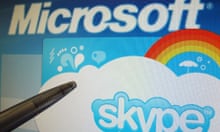After paying $8.5bn for Skype, what will Microsoft end up with? In a few years, I forecast it will be this: $8.5bn less in its bank accounts, a cats-in-a-bag fight between its Office division and its Online Services division over integration of the service, little – if any – kudos from consumers, and no appreciable effect on its bottom line.
That's right: Steve Ballmer, Microsoft's chief executive, might as well have put the money on a bonfire for all it's going to do for the company's share price, which has barely shifted in his 11-year tenure. In fact at present, the share price reckons that Microsoft is less valuable as a single entity than if it were broken up.
So what's the Skype acquisition about? Ignore the talk of synergy that Ballmer and Skype's new chief executive, ex-Ciscoer John Bates, will spout. It's about Ballmer's long-term aim to make Microsoft back into a hit brand with consumers, a position that it last held with the launch of Windows 95 in August 1995.
The trouble is that Skype is one of those great internet ideas that can't be integrated into as many places as you might think. That's partly because it uses its own protocols for the voice-over-internet system (which means it can't be integrated into other VoIP services). But it's also because even while all of our analogue conversations are being digitised, the phone system is one of those technologies so deeply embedded in our culture that you can't get it out. When I called Skype's people for comment on the talk of acquisition, it was a mobile phone number, not a Skype handle, that I looked for.
So here are the bad, and the good things, about this deal:
The bad
Mobile carriers will hate it. They will fight tooth and nail against Skype (or any sort of VoIP service, but especially Skype as I'll explain) becoming widespread on their networks. Skype turns each computer (or internet phone) using it into a "peer", part of a mesh of devices running the peer-to-peer software. Some become "superpeers", meaning they are routing data for lots of devices; if you leave Skype running on your computer but don't do anything with it, it will often turn into a "superpeer", and start sucking up your bandwidth and CPU.
For mobile carriers, the idea that people will be sucking up lots of data and bandwidth just by leaving an app running isn't new, but they'd probably prefer Microsoft not to be contributing. And given that Microsoft's Windows Phone is going to become the mobile OS for Nokia, the world's biggest handset maker (by volume, if no longer in revenue) is going to have some carriers feeling distinctly edgy this morning.
It's really, really hard to monetise. I'm presently writing a book about Microsoft, Apple and Google, and their business rivalries (PCs, search, iPods, smartphones, and tablets; out next year), and doing so has involved speaking to people all over the place – especially in the US. Ten years ago, I'd have been making expensive transatlantic calls. Now, I make the calls for free, using Skype. I made hours of calls and haven't spent a cent. As for calls closer to home, it's cheaper to use the voice minutes bundled on my mobile, or a landline: it's less hassle than making a call over Skype. Finding people on Skype is a hassle. Just ask Skype:austidoodle96. Is he really Barack Obama, of Washington DC, as his profile says? Or is it one of the other 100 contacts in the Skype directory with that name?
Skype's own numbers bear this out: it has 663 million registered users, and last year had revenues of $860m (that's $1.30 per user per year, or about 11 cents per user per month), and made a loss of $7m. It's a service that's going nowhere, monetisation-wise, because its peer-to-peer structure simply doesn't enable it. Skype makes its money from add-on centralised services – outgoing calls to landlines and mobiles, "landline" numbers (which resolve to a Skype handle), voicemail. None is essential.
Ballmer is going to have hell's own job getting it integrated into Microsoft's other offerings. Talking to people involved with Microsoft down the years, what emerges is a picture of a company where the giant profit centres – Windows and Office – determine their own agenda. Getting something done against the wishes of the Office team is like fighting a tank battle: you'd better bring one more division than your opponents. Microsoft had the idea of tablets long before Apple's iPad, but it was effectively knifed when the head of the Office division decided he didn't like them. The Office division killed the suggestion in 2005/6 by the Online Services division, then building the engine that would be come Bing, that internet search should be integrated into Office.
The Office division presently houses a homegrown voice-over-internet service called Lync. Some analysts think this morning that Skype (which is almost certain to be folded into Online Services) will be integrated into future versions of Office. History suggests it won't. I'm betting on history.
Strategically, it's nonsense (with one proviso, which I'll deal with below). When you look at Google, you realise that it benefits when it gets more people using the internet for more of the time, because it dominates search and search advertising. Hence its bold moves – making maps free, offering enormous amounts of mail storage for free, giving away the operating system for internet-enabled smartphones. They're all aimed at undercutting anything that puts a price barrier in the way of people getting online.
Look at Skype and at Microsoft, and you could only say that it looks like it's trying to kill off mobile carriers – a group with which it doesn't really have an argument (quite the opposite; it needs them for its new mobile partner Nokia, which will sell phones using its Windows Phone OS from some time after October).
Or perhaps it's going after phone companies that sell services to businesses, so that Skype will be the default way that we make phone calls. So it's trying to kill BT, AT&T and leased phone line businesses? That's not good strategy. Kill your rivals by undercutting their business model. Not your partners, or the companies you didn't have an argument with before.
It already has a fairly good consumer VoIP offering. Well, two consumer offerings actually: Microsoft Messenger (260m accounts), and Xbox Live (30m accounts). And never the twain shall meet. Now add in 660 million Skype users. Imagine being the manager given the task of integrating them so that each person has a single ID in your big database, which points to their MSN, XBL and Skype IDs, without duplication and without erasing any wrongly. Now go and lie down in a darkened room with a cold compress.
The people I've spoken to, and the history I've read, say that Ballmer is driven by the idea of making Microsoft a consumer brand, like it was back in the days of Windows 95. (Remember that?) That's why he's pushed Windows Phone, Xbox, Kinect, and now this "cool" brand. Ballmer is aware that the twin Microsoft monopolies, Windows and Office, won't survive for ever, and so new areas of focus are needed. Skype is a consumer brand. The problem is, if Microsoft tries to monetise it too hard, it will lose it to an upstart. Skype is a bird in the hand which, if it gets squeezed too hard, will simply die.
Skype's peer-to-peer nature makes it inherently unreliable. When superpeers fall down, the network degrades fast – as happened last December, with an outage that even Skype couldn't fix due to a subtle bug, because it was on computers it didn't control. Microsoft might want to consider the implications of a brand whose performance it cannot guarantee.
The good (potentially)
It's possible that Ballmer and his team have been incredibly farsighted here. (They are incredibly smart people – though not as smart as those at the top of Google or Apple, but close.) Take this scenario: smartphones with internet capability are rising rapidly as a proportion of handset sales, so that in the first three months of this year they made up 47% of sales in western Europe.
Throw that forward a few years, and we're all effectively walking around with what are effectively mobile computers in our hands, connected to data networks. Computers? That means we could make a voice-over-internet call, for free, rather than using valuable (and costly) voice minutes. Even better, you could call another mobile (because that's a computer too), and it would be completely free. No roaming charges, no costs! It's the ultimate dream for the everything-must-be-free crew. And Microsoft will be monetising it all.
If I knew the idea of buying Skype had come from Bill Gates, I'd trust that vision. Gates, everyone I've spoken to agrees, is fantastic at the long view for technology. But Ballmer? They all go quiet. Ballmer is very smart, but he's not a great technology seer. That's what Microsoft has been missing for the past few years.
Skype integrated into Office integrated into switchboards could be an awesome lock on businesses. Many small businesses are using Skype for outgoing calls, especially international ones, because it reduces their costs. But if the phone cartels decide to fight it and lower their prices, what's the benefit?
Conclusion
Overall? It's an audacious move. But Skype is more useful as a service you use rather than own. Peer-to-peer services have turned out to be the internet phenomenon that nobody can monetise profitably. The first was Napster (which could have generated huge revenues, if only the record companies had let it). The next was the music-sharing system KaZaA, made useful by Skype founder Niklas Zennstrom; that got sued to oblivion. (Zennstrom had sold out by then.) Then there was Joost, a P2P TV service – Zennstrom's work again. It submerged.
So what then is Skype? It's a trophy. But Microsoft would be wise not to think it's won the match. The most interesting thing will be Google's reaction: it has its own VoIP service, Google Talk, and we'll know whether it thought Skype was a clever acquisition from what it says in the next few days. The numbers, though, suggest that Steve Ballmer has made headlines, but it's not going to help the stock. And isn't that what you're meant to spend your stockholders' money on – not trophies?




Comments (…)
Sign in or create your Guardian account to join the discussion